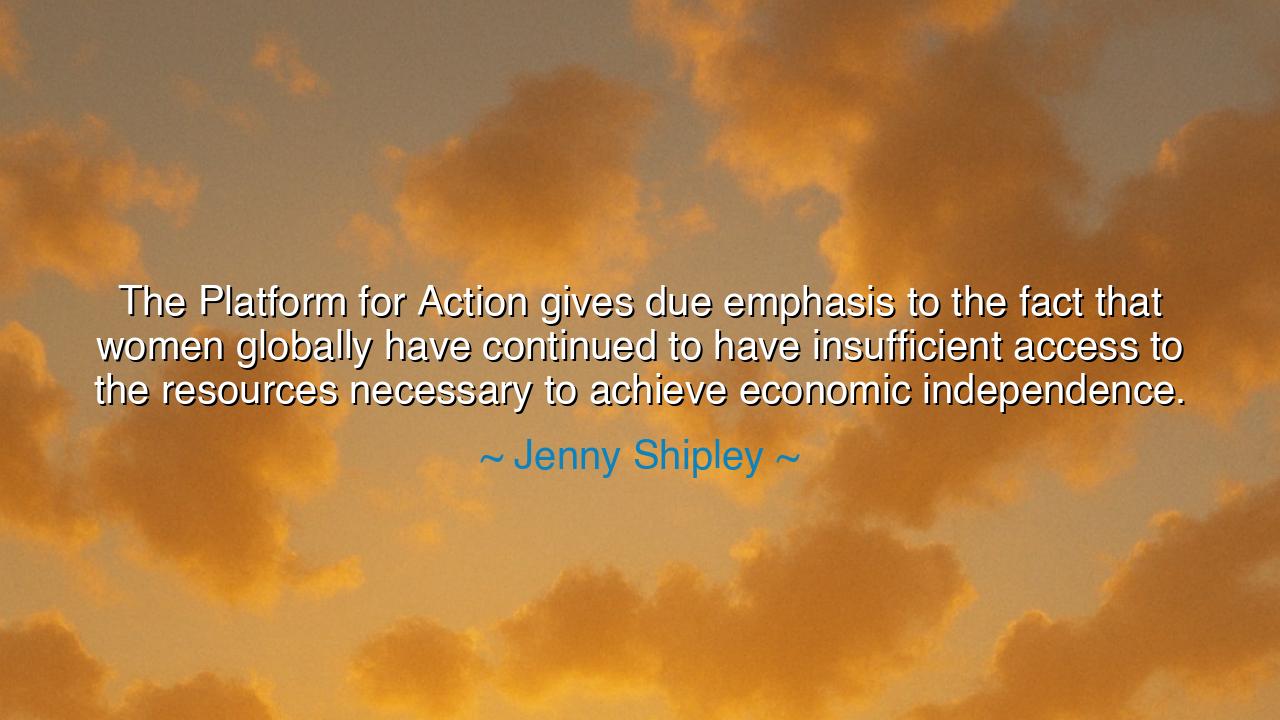
The Platform for Action gives due emphasis to the fact that women
The Platform for Action gives due emphasis to the fact that women globally have continued to have insufficient access to the resources necessary to achieve economic independence.






“The Platform for Action gives due emphasis to the fact that women globally have continued to have insufficient access to the resources necessary to achieve economic independence.” Thus spoke Jenny Shipley, former Prime Minister of New Zealand and a champion of human dignity. Her words echo not merely as a policy statement, but as a lament and a summons — a cry for justice across the ages. For within this sentence lies the enduring struggle of half of humankind: the struggle for economic independence, without which freedom itself is but an illusion. Shipley speaks not as one who observes from afar, but as one who has seen the burdens women carry when opportunity is withheld, when their labor is unseen, and when their potential is caged by the walls of poverty and tradition.
The origin of this quote rests in the wake of the Beijing Platform for Action, adopted at the Fourth World Conference on Women in 1995 — one of the most significant gatherings in the history of women’s rights. Delegates from every corner of the world came together, not as adversaries but as allies, to forge a vision of equality that would transcend borders and generations. This Platform for Action declared that no society could call itself free while its women remained bound, and that economic independence — the ability to earn, to choose, to shape one’s destiny — was the foundation upon which all other freedoms must rest. Shipley, reflecting upon this truth, warned that though the words had been spoken and the commitments made, the reality remained incomplete. The barriers of access, education, property, and finance still chained millions in quiet servitude.
To understand Shipley’s insight, one must look to history. For centuries, women’s labor has been both essential and undervalued. In the fields of ancient civilizations, in the workshops of the Industrial Revolution, and in the homes of every age, women built the economies of nations while owning little of what they created. Even in the modern era, when education and technology have opened new horizons, resources — land, credit, training, and capital — remain unevenly distributed. A woman may till the earth, but the title to the soil belongs to another; she may sew garments for the world’s markets, yet cannot afford to clothe her own children. Shipley’s words pierce this injustice: that talent without tools, labor without reward, and effort without empowerment are chains by another name.
There are, however, those who broke these chains and became beacons to others. Consider Wangari Maathai of Kenya, who began with nothing but courage and a seedling. She saw how the destruction of the land deepened the poverty of women, and how the poverty of women deepened the wounds of society. Through her Green Belt Movement, she empowered thousands of women to plant trees, to nurture life, and in doing so, to reclaim not only the soil but their economic independence. She was awarded the Nobel Peace Prize, but her greatest victory was the transformation of women from victims of circumstance into guardians of renewal. Her life stands as a living echo of Shipley’s truth: that when women have access to resources, they do not merely survive — they create futures.
The insufficient access Shipley names is not a matter of wealth alone; it is a matter of justice. It is the silent theft of opportunity that occurs when women are denied inheritance, when they lack education, when their wages are lower for the same labor, or when credit is withheld because of gender. These injustices are not only moral failures — they are failures of civilization itself. A society that withholds resources from half its people wounds its own strength, for how can a tree flourish if it waters only one branch? The Platform for Action calls not merely for reform, but for transformation — for the reordering of priorities so that every human being, regardless of gender, can stand upright in the dignity of self-reliance.
Yet Shipley’s reflection also contains hope — the quiet yet unyielding hope that change is possible. Around the world, women have risen from the margins to the center, proving that investment in women is investment in humanity itself. Microfinance programs in Bangladesh, female-led cooperatives in Latin America, and women entrepreneurs in Africa and Asia have shown what happens when resources are shared and independence is granted. The harvest of equality is not division, but abundance. For when women thrive, families prosper, communities strengthen, and nations rise.
Let this, then, be the lesson carried forward: that true progress is not measured by the wealth of a few, but by the independence of all. Freedom that excludes is not freedom at all; justice that favors one half of the world is no justice. To build the future Shipley envisions, each generation must labor not in complacency but in conviction — ensuring that education, land, capital, and opportunity are open to every hand willing to work.
And so, dear listener, remember this: economic independence is not merely a goal for women; it is the foundation of human dignity. When women have access to the tools of creation, they do not merely change their lives — they transform the destiny of nations. As the ancients taught, a society is strongest when all its citizens stand tall. Let us, then, build such a society — one where independence is not the privilege of a few, but the inheritance of all.






AAdministratorAdministrator
Welcome, honored guests. Please leave a comment, we will respond soon